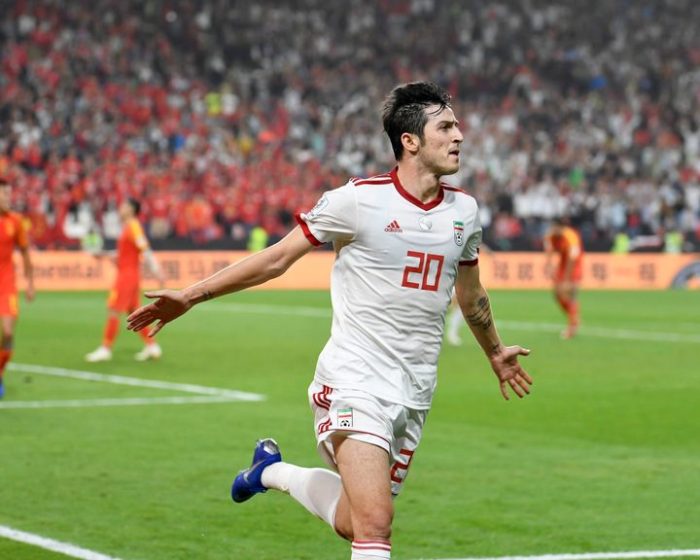Sardar Azmoun: Bayer Leverkusen add goals and depth below market value

Iran's forward Sardar Azmoun celebrates his goal during the 2019 AFC Asian Cup quarter-final football match between China and Iran at the Mohammed Bin Zayed Stadium Stadium in Abu Dhabi on January 24, 2019. (Photo by Khaled DESOUKI / AFP) (Photo credit should read KHALED DESOUKI/AFP via Getty Images)
Forbes – LEVERKUSEN, It is one of the more exciting transfers of this Bundesliga transfer window. On the day before deadline day, Bayer Leverkusen signed Sardar Azmoun for $4.4 million from Russian club Zenit St. Petersburg.
The 27-year-old Iranian had previously agreed on a free summer transfer with Die Werkself. Overall it is a brilliant deal for Leverkusen, who signed the forward in a deal significantly below Azmoun’s $27.5 million Transfermarkt market value.
“We’re delighted to have completed this transfer,” Bayer Leverkusen sporting director Simon Rolfes said in a club statement. “Sardar Azmoun has been one of Russian football’s top goalscorers for several years. He’s been champion three years in a row there with Zenit, regularly played in the Champions League, and shown himself to be of international class at the highest level. Our attack gains extra quality with him. Sardar will make our attack even more unpredictable and powerful.”
Azmoun, without a doubt, brings added depth to Leverkusen’s attack. The 27-year-old has been a star in Russia for some time and joined Zenit from Rubin Kazan in February 2019 in a deal worth $13.2 million. It was Kazan who found the striker in Iran, where he played for Sepahan’s youth academy. But it would be at Rostov where Azmoun made a name for himself, scoring 25 goals and six assists in 77 games. Two of those goals came against Bayern Munich and Atlético Madrid in Rostov’s memorable 2016/17 Champions League campaign.
Rostov had bought the striker for just $2.53 million in 2016 from Rubin Kazan. But Russian football is not always that straightforward. Like many Russian clubs, Rostov always struggled with finances, and Azmoun wanted out of the club. Around that time, Azmoun was consistently linked with a move to one of the top four leagues; reports suggested links to Liverpool, several Italian clubs, but also Borussia Dortmund.
Instead, what happened was so very typical for business practices of clubs in the post-Soviet space. Only very few institutions in the region are able to develop players and sell them at the right time. Also, players often fail to find the right move, add agents to the mix, and it becomes a difficult proposition all around. Azmoun, for example, did not move to Europe but instead back to Rubin Kazan in 2017, where the owner, the Republic of Tatarstan, was once again on a spending spree.
Those spending sprees, however, also come and go; Rubin as a club has always been between very rich and very poor; there is no middle ground. As a result, Azmoun was sold to Zenit in 2019. For most talented players based in Russia, the story would have ended here—Zenit, owned by Gazprom, can pay wages at a tax rate that is often impossible to match for the big clubs in Europe and, as a result, players are unlikely to move on.
The same was thought of Azmoun, but instead, the Iranian has made the move to a top-four league after all. What remains to be seen is whether the move comes at the right time; Azmoun is no longer a talent but, at 27, a veteran. At the same time, that can be an asset too; Leverkusen receives a player with significant experience in the ups and downs of a football career.
But how will Azmoun fit in the squad? At first glance, Azmoun is a clear-cut number 9, and in that position, Leverkusen has Patrik Schick, one of the most productive strikers in European football. But Schick has been heavily linked with a move to Borussia Dortmund, where he could replace Erling Haaland. Azmoun could be an investment for the future, a possible replacement for the Czech goalscoring machine.
There is, however, also room for Schick and Azmoun to play together. Although most commonly employed as a lone-striker in a 3-4-3 system by Zenit this season, Azmoun has also played with a Schick type of number 9 in Artem Dzyuba this year. Azmoun can add more tactical depth to Gerardo Seoane’s side at Leverkusen. In fact, the Swiss head coach previously preferred a 4-4-2 system rather than the 4-2-3-1 system used by Leverkusen this year, adding Azmoun now.




